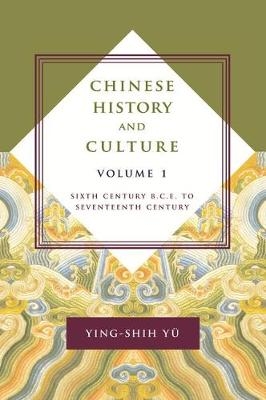
Chinese History and Culture
Columbia University Press (Verlag)
978-0-231-17858-7 (ISBN)
Essays incorporate the evolving conception of the soul and the afterlife in pre- and post-Buddhist China, the significance of eating practices and social etiquette, the move toward greater individualism, the rise of the Neo-Daoist movement, the spread of Confucian ethics, and the growth of merchant culture and capitalism. A true panorama of Chinese culture's continuities and transition, Yu Ying-shih's two-volume Chinese History and Culture gives readers of all backgrounds a unique education in the meaning of Chinese civilization.
Ying-shih Yu is a preeminent historian of China. Awarded the John W. Kluge Prize for achievement in the Study of Humanity and the inaugural Tang Prize International Award in Sinology, he has published more than thirty books and five hundred articles and essays on Chinese history, thought, politics, and culture. His most recent works include Lun tian ren zhi ji (Between Heaven and the Human: An Exploration of the Origin of Ancient Chinese Thought, 2014), Zhu Xi de lishi shijie (The Historical World of Zhu Xi: A Study of the Political Culture of Song Intellectuals, 2003, 2011), and Shi yu Zhongguo wenhua (Chinese Intellectuals and Chinese Culture, 2003, 2010, and 2013). Josephine Chiu-Duke is associate professor of Chinese intellectual history in the Asian Studies Department at the University of British Columbia. She is the author of To Rebuild the Empire: Lu Chih's Confucian Pragmatist Approach to the Mid-T'ang Predicament (2000), editor of Liberalism and the Humanistic Tradition-Essays in Honor of Professor Lin Yu-sheng (2005), and co-translator of Ge Zhaoguang's An Intellectual History of China, Volume 1: Knowledge, Thought, and Belief Before the Seventh Century C.E. (2014). Michael S. Duke is professor emeritus of Chinese and comparative literature at the University of British Columbia. He is the author of several books on modern and traditional Chinese literature, including Blooming and Contending: Chinese Literature in the Post-Mao Era (1985), translator of Koonchung Chan's The Fat Year (2011), and co-translator of Ge Zhaoguang's An Intellectual History of China, Volume 1 (2014).
Author's Preface Editorial Note List of Abbreviations Chronology of Dynasties 1. Between the Heavenly and the Human 2. Life and Immortality in the Mind of Han China 3. "O Soul, Come Back!" A Study in the Changing Conceptions of the Soul and Afterlife in Pre-Buddhist China 4. New Evidence on the Early Chinese Conception of Afterlife 5. Food in Chinese Culture: The Han Period 6. The Seating Order at the Hong Men Banquet 7. Individualism and the Neo-Daoist Movement in Wei-Jin China 8. Intellectual Breakthroughs in the Tang-Song Transition 9. Morality and Knowledge in Zhu Xi's Philosophical System 10. Confucian Ethics and Capitalism 11. Business Culture and Chinese Traditions-Toward a Study of the Evolution of Merchant Culture in Chinese History 12. Reorientation of Confucian Social Thought in the Age of Wang Yangming 13. The Intellectual World of Jiao Hong Revisited 14. Toward an Interpretation of Intellectual Transition in the Seventeenth Century Acknowledgments Appendix. The John W. Kluge Prize Address and The Tang Prize for Sinology Acceptance Speech Index
| Erscheinungsdatum | 14.10.2016 |
|---|---|
| Reihe/Serie | Masters of Chinese Studies |
| Verlagsort | New York |
| Sprache | englisch |
| Maße | 156 x 235 mm |
| Themenwelt | Geisteswissenschaften ► Geschichte ► Regional- / Ländergeschichte |
| Geisteswissenschaften ► Philosophie ► Östliche Philosophie | |
| Geisteswissenschaften ► Religion / Theologie ► Weitere Religionen | |
| ISBN-10 | 0-231-17858-1 / 0231178581 |
| ISBN-13 | 978-0-231-17858-7 / 9780231178587 |
| Zustand | Neuware |
| Haben Sie eine Frage zum Produkt? |
aus dem Bereich


